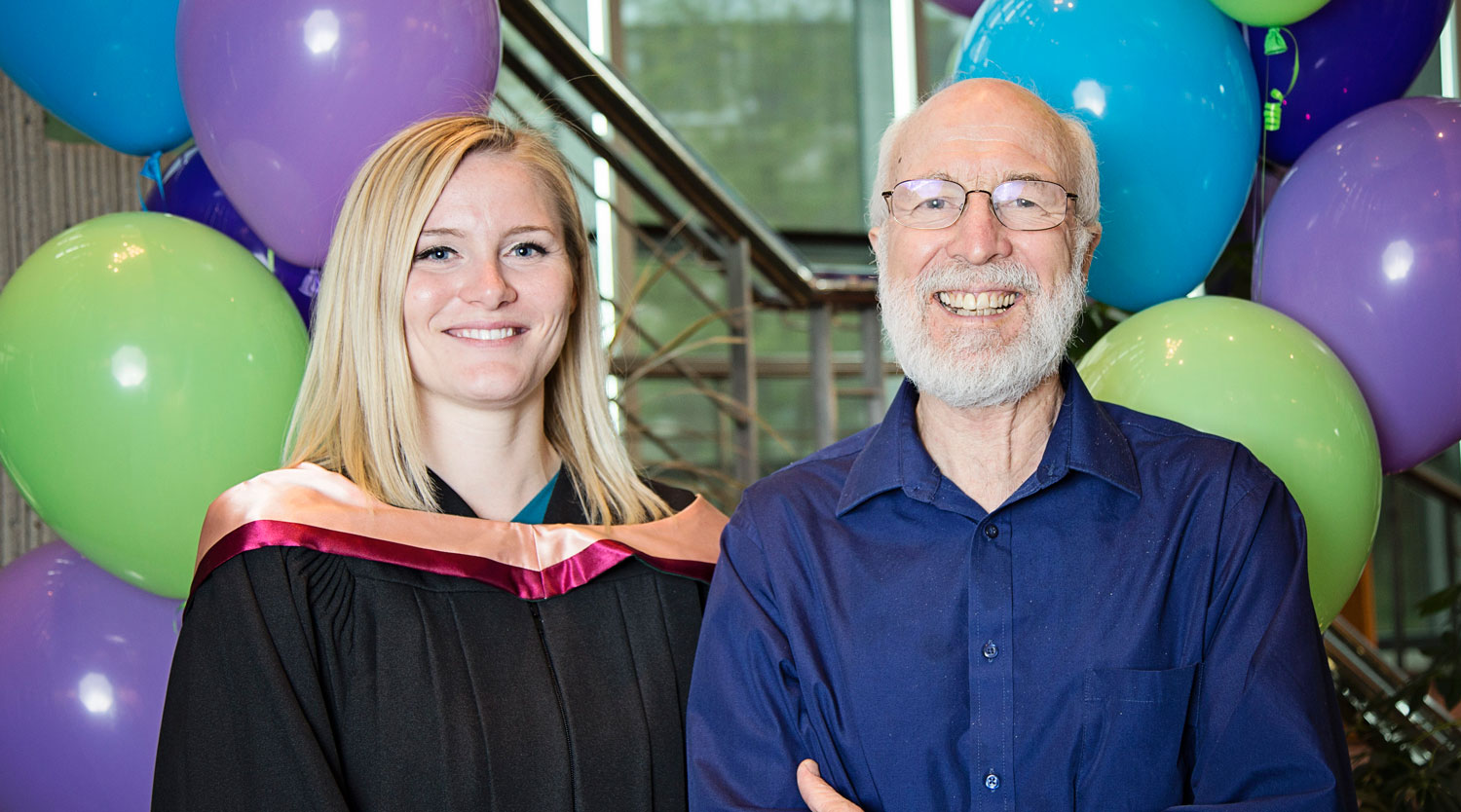
Bernice Tiggelaar (MPH '16) with advisor Duncan Saunders.
Sometimes good intentions aren't good enough.
This is what recent graduate Bernice Tiggelaar (MPH '16) discovered during an international medical experience during her undergraduate program.
"I realized we sometimes have the instinct to jump in and out of countries without establishing firm partnerships or taking the time to assess what communities, organizations or health systems really need," explains Tiggelaar, who completed a master of public health (MPH) degree in global health. "I found that this mentality-although with good intent-was not sustainable and could potentially do more harm than good."
She knew there had to be a better way.
As a child, Tiggelaar had a passion for the global community.
"I was always aware that being Canadian was not something I deserved-I could have easily been born anywhere else in the world," says Tiggelaar. "I realized that not everyone has the privilege of being in a country with established health systems, or even basic water and sanitation systems. I wanted to make an informed difference."
Pursuing a master's degree specializing in global health was a natural choice.
"My then fiancé, Sean Tiggelaar (MSc '16), had made the decision to attend the School of Public Health, so I joined him in Edmonton and registered for electives in the School," says Tiggelaar. "After seeing the calibre and passion of students at the School, and how challenging and relevant the courses were, I knew this was a program I had to be in."
Another enticing part of the MPH program for Tiggelaar was the practicum component. She knew doing an internship that provided practical experience would assist her in finding employment after graduation. Perhaps most enticing was that global health students have the potential to do an international practicum. That was something Tiggelaar had been dreaming about from the moment she had applied.
"I was at the Canadian Conference on Global Health when I heard Salim Sohani and other staff from the Canadian Red Cross speak," explains Tiggelaar. "Their presentations on disaster response and community health resonated with me. I wanted to learn more about their work, so I approached them."
What Tiggelaar didn't know at the time was these brief interactions would help chart a new path for her future.
After speaking with Sohani, Tiggelaar reflected on her goals. She wanted to begin her career in Canada, learn about program planning and development, and didn't want to go into a country, volunteer and leave. She soon set her sights on the Canadian Red Cross and requested an internship with the health team in International Operations.
Tiggelaar spent three months in Ottawa reading through thousands of articles to prepare a literature review on reproductive, maternal, newborn and child health in humanitarian crises. She presented her findings to the Canadian Red Cross International Operations, and at the Canadian Conference on Global Health in Montreal.
"The experience was unparalleled," reflects Tiggelaar. "I found an organization that aligned with my core values, a placement I was passionate about and was mentored by a supervisor-Sohani-who encouraged my continuous growth."
And he continues to mentor her today.
Now, Tiggelaar is employed with the Canadian Red Cross as a program officer in the Global Health Unit in Ottawa. Together with the local Philippine Red Cross, Tiggelaar and colleagues are planning a program focusing on disaster risk reduction and preventing health emergencies on Panay Island in the Philippines; an island that was affected by Typhoon Haiyan, locally called Typhoon Yolanda, in 2013. This work will make communities more resilient when the next typhoon hits.
"When I go there, I see risks everywhere," says Tiggelaar, who has been on two planning missions so far. "The Philippines sees typhoons and flooding at least once a week during the rainy season, which is expected to increase late this year due to La Nina. Few of these are large enough to warrant international media attention which results in monetary donations. The local disasters that go unnoticed along coastal communities can destroy boats, homes, farms and, ultimately, livelihoods."
And although the significance of her work may not be as easily measured or as immediate as when she practiced as a registered nurse, Tiggelaar has confidence in her organization and the work they do.
"We are often told problems are too big-the solutions too complicated-and to be realistic about our capabilities," says Tiggelaar. "But I am a dreamer and, from my work at the Canadian Red Cross, I see this sentiment isn't true."
"Each of us can influence change. As Canadians, we have been privileged to grow up in the best country in the world. I believe it is our duty to partner and share ideas, knowledge and resources with people around the world."Sean and Bernice Tiggelaar were proudly welcomed as new alumni of the School of Public Health, alongside 46 of their classmates in the Class of Spring 2016 on Wednesday, June 8. Bernice graduated with her master of public health in global health and Sean graduated with his master of science in health technology assessment. The couple that studies together, graduates together. Congratulations to the Class of Spring '16.